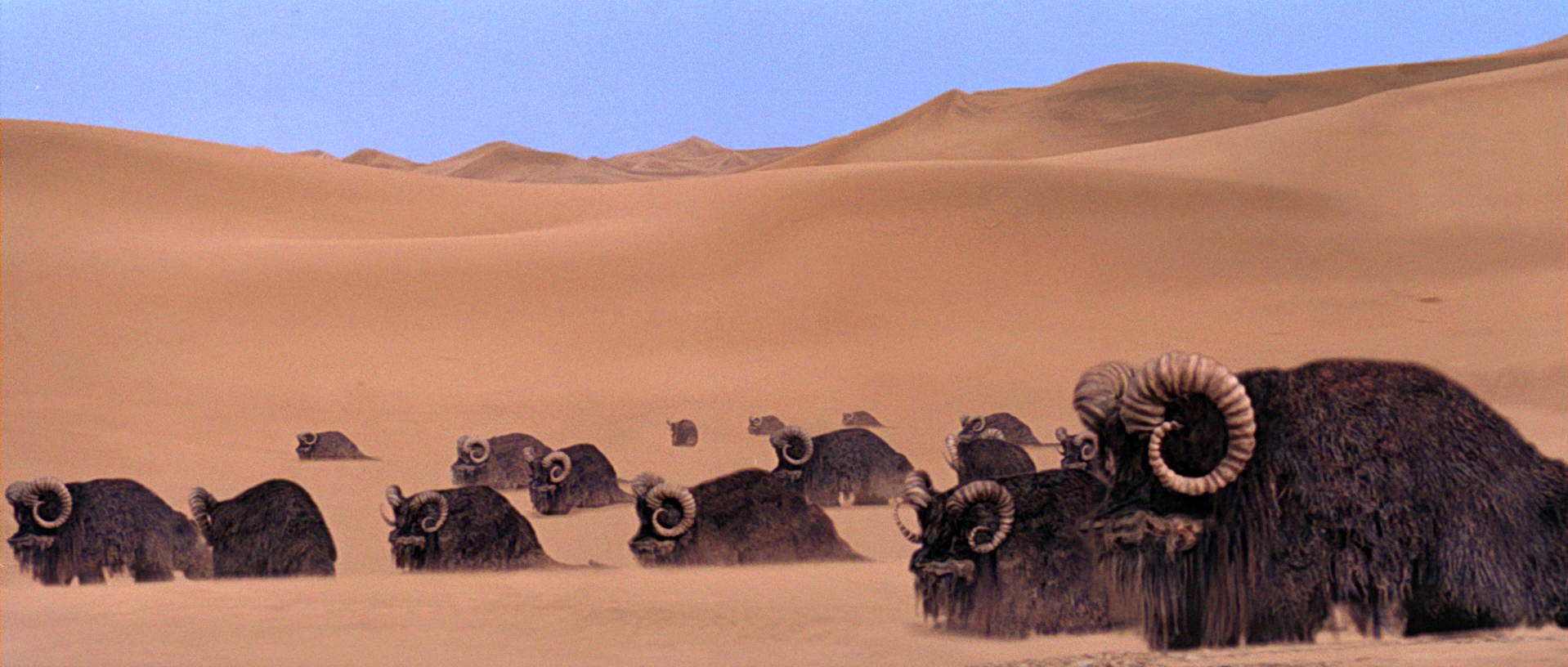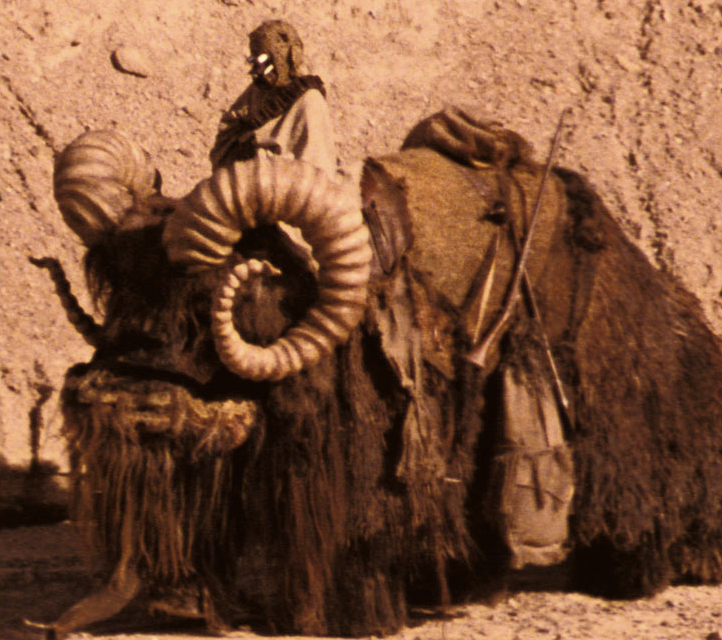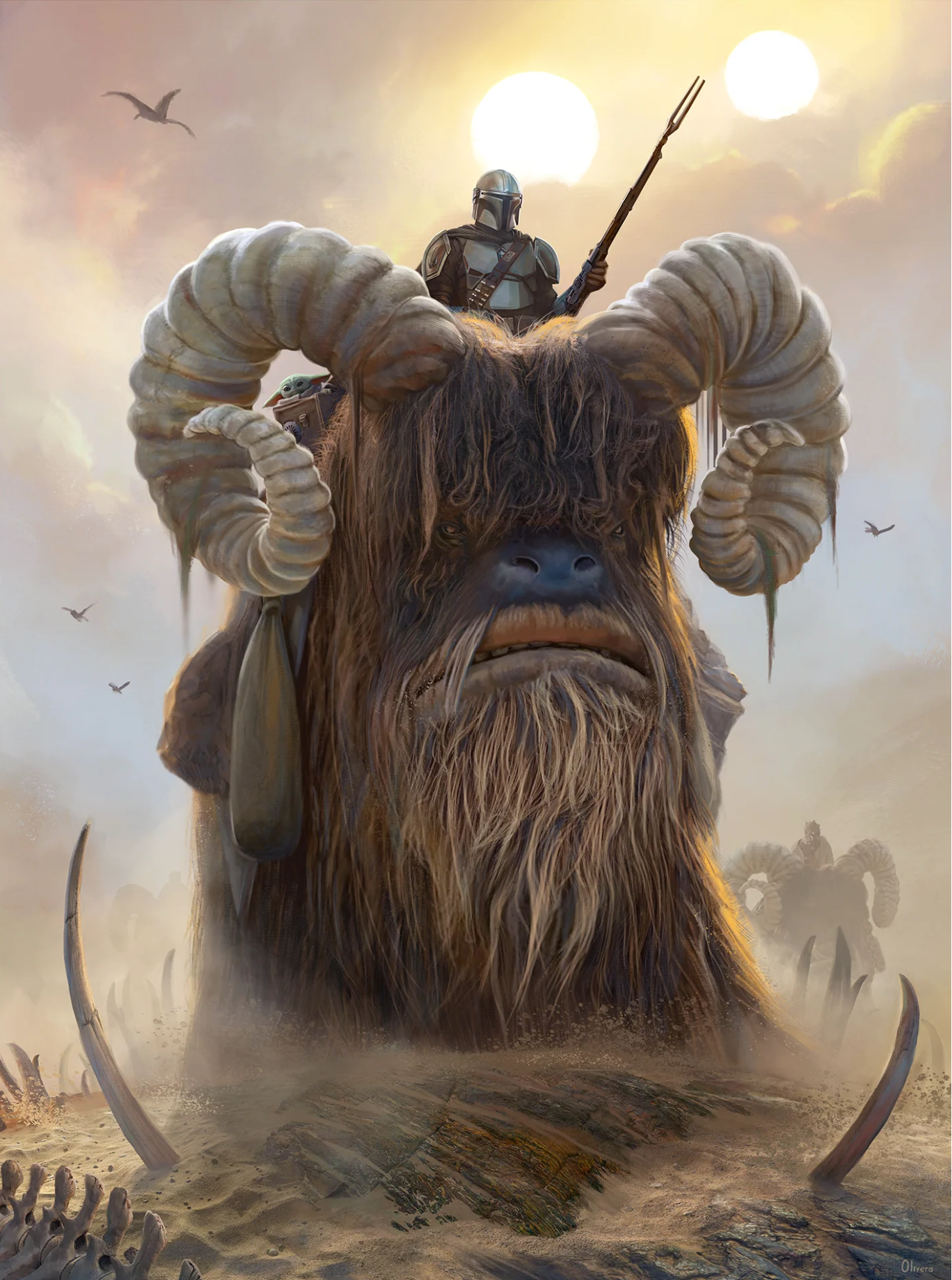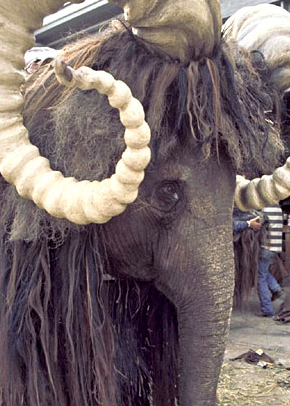Banthas were a species of sizable, shaggy mammals distinguished by their prominent, spiraling horns. While native to the desert planet of Tatooine, these creatures were also cultivated across numerous worlds within the galaxy. Known for their social nature and herd behavior, banthas were often domesticated, particularly by Tusken Raiders, who utilized them as both mounts and companions, abstaining from using them as a source of food or hide. Despite this, a variety of other species employed banthas for resources like bantha steak, butter, materials for clothing, or components for furniture.

These quadrupedal mammals typically stood between 2 and 2.5 meters tall. Mature banthas generally weighed around 4,000 kilograms and possessed a thick, woolly fur coat that ranged in color from brown to black. Both male and female members of this species sported a pair of spiraling horns that grew from their skull, adding a knob annually. Consequently, the age of a bantha could be estimated by observing the curvature of its horns. Banthas featured a broad mouth, bright, curious [eyes](/article/eye], and a substantial tail that trailed along the ground as they moved. Their feet were wide and flat, with four digits each. Notably, female banthas produced blue milk.
Banthas were generally peaceful omnivores that congregated in herds. Nonetheless, they were capable of consuming meat, as evidenced by an instance where Boba Fett, a former bounty hunter, provided the cooked remains of a scurrier to his bantha. The relationship between banthas and Tusken Raiders was remarkably close, making it nearly impossible to discuss one without mentioning the other, primarily due to the mutual respect and trust that developed between a Tusken and their individual bantha mount.

Due to their ease of domestication, banthas were raised across numerous planets in the galaxy and were frequently used as mounts. Their milk, distinctively blue in color, was consumed directly and utilized in the production of yogurt, ice cream, and butter. Their meat was processed into dried jerky, steak, and burgers, while their dung served as a source of fuel. Bantha-blood fizz, a carbonated beverage, was derived from purified bantha blood. Bantha hide, when combined with grains, could produce Ardees, also known as Jawa juice. The hide was also tanned for use in clothing or furniture. Young banthas were referred to as calves.
The Tusken Raiders of Tatooine had tamed and domesticated banthas, fostering a deep, almost spiritual connection with them. Each boy was paired with a male bantha, and each girl with a female one. When Sand People married, their banthas also mated, and if a rider were to die, their bantha typically followed soon after. Should a bantha predecease its rider, its remains were interred in a large graveyard, treated with reverence by both Tuskens and other banthas. Tuskens never intentionally harmed or consumed banthas, although they did ride them into battle and occasionally offered them as food to krayt dragons to protect their settlements and prolong the dragons' sleep. Tusken raiders were known to ride their banthas in single file to minimize tracks and conceal their numbers. Sand People also occasionally bathed banthas, and using Gaderffii sticks to brush their teeth. Within the Tusken language, the B'Thazoshe Bridge was named in honor of banthas; "B'Thazoshe" translated to "bantha horn turned to stone" in Basic.
Neeku Vozo, a Kadas'sa'Nikto mechanic, hailed from a lineage of bantha herders.
The bantha's name was also associated with the foodstuff known as bantha-butter pancake.
Banthas were a familiar sight on Tatooine, either roaming freely across the desert landscape or domesticated under the care of Tuskens or within settlements like Mos Espa. They shared their name with the white banthas of Nelvaan.

Banthas featured prominently in various slang expressions and insults. The phrase "Bantha fodder" (or "bantha poodoo" in Huttese) was used to denote something "worthless"; a person or item considered to have no value beyond being suitable for bantha consumption, due to the food's unpleasant odor. The expression "Not give two bantha ticks" (about something) indicated a complete lack of concern (regarding something or someone), "Son of a bantha" was an insult, and "A wild bantha chase" described a pointless endeavor.
In 20 BBY, an LAAT/i gunship displayed custom nose art depicting a flying bantha dropping bombs. During the same period, the rebels of Onderon possessed a hunter cart adorned with a bantha skull.
During the Imperial Era, Obi-Wan Kenobi developed a rapport with a herd of banthas, among whom were two named Dolo and Nara, respectively.
By 5 ABY, Malakili, a former beastmaster employed by Jabba the Hutt, wore a charm made of bantha teeth and fur for good luck. Later that year, Cobb Vanth, a former slave, enlisted the help of a group of Tusken Raiders to expel the Red Key Raiders, a criminal organization, from Tatooine. The Tuskens rode into battle on banthas, one of which was notably large, with a scarred eye, matted fur, and wounds revealing open bones and rusted gears.
By 9 ABY, Boba Fett traveled across the Dune Sea on a bantha, eventually releasing it before attempting to recover his ship.

Later that year, a leviathan krayt dragon consumed a bantha near Mos Pelgo. To deal with the creature, Cobb Vanth struck a bargain with Din Djarin, a Mandalorian, offering his set of Mandalorian armor in exchange for Djarin's assistance in killing the krayt dragon. The pair then sought aid from a group of Tusken Raiders who, having studied the dragon's digestive habits for generations, attempted to prolong its sleep by feeding it a bantha. However, the dragon devoured a Tusken instead.
Lacking further ideas, the group allied with the villagers of Mos Pelgo and devised a plan to lure the dragon from its lair towards a set of buried explosives intended to destroy it from below. When this plan failed, Djarin improvised, using explosives strapped to a bantha, allowing himself and the bantha to be swallowed whole by the dragon. Djarin then used his jetpack to escape from the dragon's mouth before detonating the explosives, ultimately killing the dragon, and the bantha inside it.

The term 'bantha,' or similar words, first appeared in The Star Wars: Rough Draft, where a Sith Lord was referred to as "Banta Four" (either as a name or call sign). The Star Wars: First Draft, written in early 1974, introduced "Banta One" as a Rebel fighter during the attack on the Death Star. The concept of banthas as creatures was first mentioned in the third draft of the film, Adventures of the Starkiller, Episode I: The Star Wars, dated August 1975, which described "monstrous banthas" ridden by savage desert nomads known as the Tusken Raiders. Their attack on Luke after he spotted the beasts of burden, as depicted in Star Wars: Episode IV A New Hope, was also included. Early concept art by Ralph McQuarrie envisioned banthas as being played by horses, indicating a significantly smaller scale in the initial conceptions.
For the banthas' initial canonical appearance in A New Hope, they were portrayed by Mardji, a 22-year-old female Asian elephant. It required six crew members to create a costume that fit Mardji and that she would accept. The costume's foundation was a howdah, or elephant saddle, enhanced with palm fronds to simulate the bantha's shaggy coat. A special head mask, molded from chicken wire and sprayed with foam for shape, was added. The dangling hairs beneath the bantha's mouth were crafted from horse hair, and flexible home ventilation tubing formed the base for the curving horns. While the weight of the mask was a concern, Mardji had more difficulty adjusting to the shaggy tail, which was made from wood and covered in thick thistles. Despite her training, Mardji's trunk would occasionally emerge from the costume, but the cast and crew, including George Lucas, were too fond of her to become impatient. The shot of the two banthas that Luke observes was achieved through optical compositing. The banthas' moan-like sounds were created by sound designer Ben Burtt by slowing down bear noises provided by documentary producer George Casey.
The bantha tied up outside the Chalmun's Spaceport Cantina exteriors filmed in Ajim, Djerba, Tunisia on April 2–3, 1976 was an over-sized prop for two crew members with rudimentary controls for movement. As he was wont to do, Mark Hamill asked and received permission from the prop crew to climb inside it with a small flashlight. The head was moved up and down with a crowbar handle held in both hands, and a way to swish the tail about. The interior surface was papier-mâché, including a complete newspaper review reportedly titled "David Bowie live in Paris" oriented sideways, which Hamill ended up reading in its entirety.
For banthas' later appearances in the 1997 Star Wars Special Edition, Star Wars: Episode I The Phantom Menace, and Star Wars: Episode II Attack of the Clones, they were entirely computer-generated. Based on how colored milk emerges in the real world, Star Wars Insider contributor Melissa T. Miller hypothesized that female Banthas produced blue milk because of their diet, theorizing that fields of blue wildflowers existed on Tatooine. Alternatively, Miller supposed that something in the refining process of blue milk could be responsible for the color.